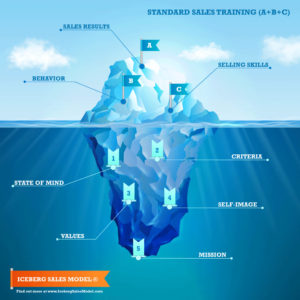In our experience, what lies just under the surface of successful sales executives are complicated layers of identity and mission. While there are two consistent external reasons for doing this work, our internal motivations are as wide ranging as stars in the night sky. It’s these internal factors that most often help us succeed – or inhibit our progress.
On the surface, sales executives do this work for two primary reasons: the income potential and the ability to make their own schedules. The outside sales executive is still able to control their fate; they’re running a business without the risk normally associated with being an entrepreneur.
But what are the true motivating factors behind a sales person’s mission to sell more products? Why do we do what we do?
Some of the more common motivating factors behind our sales activity include:
- To help your customers by providing them with a solution to a problem
- To make as much money as you can
- To prove something to yourself
- To beat your fellow sales colleagues
- To help other people to achieve their goals
- To improve the profitability of your customer’s business
- To keep your manager or family happy
- To beat your previous sales record
While the mission of a sales rep is to always close the next deal, there is a secondary internal mission to consider. The true internal mission of a sales executive is the real driver of their external behavior.
For example, if your internal motivations have to do with making more money so you can buy what you desire, then your mission is to accumulate wealth. Your values and belief structures probably focus on outward manifestations of success: a new car, a nice home, or a better school for the kids.
If your mission is to help clients improve their situation, your values and belief structures will be more altruistic and you will see yourself as a facilitator who is helping find the right solution to help your prospect succeed. Your own success will be the secondary result of helping people. Your values and belief structures are likely very different from the wealth-driven sales professional.
If a sales rep is internally motivated by winning, then your competitive nature will drive you to beat last month’s sales record, or achieve more than the sales rep sitting next to you. You try to close a deal because you’re hooked on the win, and it’s your personal motivation driving you toward a successful sales career.
The mission and internal identity of a sales executive could encompass one of these characteristics or an element of all of them. The point is that it is extremely important to understand the internal motivations of a sales executive. Understanding how you see yourself, or, if you’re a sales manager, understanding what drives the individual members of your team, is crucially important to your bottom line.
The best sales models take the time to understand the true human motivators behind the activity. If sales numbers are down, don’t revise the comp plan in the belief that this will motivate more behavior. Throwing more money at the team may motivate some of them – but not all.
The Iceberg Sales Model goes below the surface of a sales professionals activity to evaluate and hone the internal motivations that drive behavior. Standard sales training models focus on the most visible, conscious elements like surface selling skills and activity levels. That’s why traditional sales training simply doesn’t stick.
When you tackle the underlying reasons for behavior: state of mind, convictions, values, mission and self-esteem, the external manifestations of these strongly held belief systems will improve, leading to more effective activities – and an increase in closed deals.
Contact us today for a complimentary consultation that could have an immediate impact on your bottom line.








